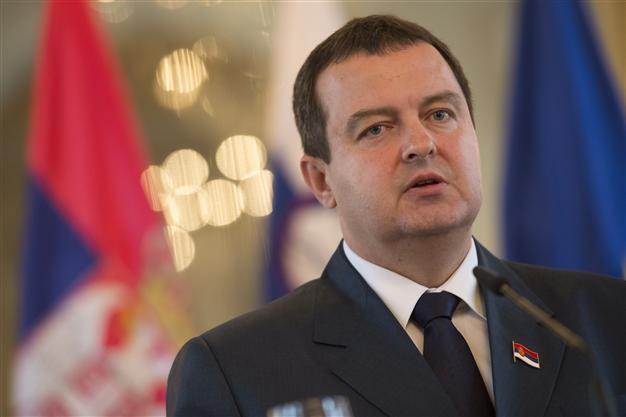Serbia says it uncovers plot to bring down government plane
BELGRADE - Reuters

Serbian Prime Minister Ivica Dacic says he is being targeted by forces trying to halt the government's fight against organised crime and corruption. AFP photo
Serbian authorities said they had uncovered a plot by "criminal clans" to bring down a government plane carrying a national leader, in the latest twist to a murky row over the links between mafia and politicians.In a statement, the Interior Ministry said Prime Minister Ivica Dacic, who is also interior minister, had nevertheless decided to board one of the government's two planes for his return to Belgrade from Dublin on Thursday evening.
Dacic is at the centre of a row over links between him and his aides to an alleged drug smuggler, following a series of revelations in the Serbian press this month that have rocked the six-month-old ruling coalition.
He has admitted meeting Rodoljub Radulovic, known as Misha Banana, in 2008 and 2009, but denied any wrongdoing.
Dacic says he is being targeted by forces trying to halt the government's fight against organised crime and corruption.
Some analysts, however, suspect political gamesmanship within Dacic's coalition government, with his partners, the increasingly-popular Serbian Progressive Party (SNS), eyeing a snap election that would almost certainly cement its hold on power. The SNS denies waging a smear campaign.
The ministry statement said the intelligence service had discovered that "certain criminal clans", working with individuals with access to the government aircraft, planned to induce a malfunction during a foreign trip by either President Tomislav Nikolic, Dacic or SNS leader Aleksandar Vucic, who is leading the crackdown on organised crime.
"The malfunction would cause limited damage and after take-off would bring down the plane," it said.
Plans of buying new plane
he statement noted that the government's official planes, a 30-year-old French-made Falcon 50 and 21-year-old Learjet 31, have been prone to malfunction. The cash-strapped government is considering buying a new Falcon 900 LX, worth around 30 million euros ($40 million).
Serbia is still wrestling with the nexus of crime and politics that took root during Yugoslavia's bloody collapse in the 1990s, and is no stranger to political assassination.
Zoran Djindjic, the country's first prime minister after the overthrow of late strongman Slobodan Milosevic in 2000, was shot dead in Belgrade in 2003 in an assassination carried out by former members of an elite police unit working with the mafia.
The interior ministry and Serbian security services are notoriously factional and used as political levers by rival parties.
Dacic was a fervently anti-Western aide to Milosevic during the Yugoslav wars, but has since swung behind Serbia's bid to join the European Union. He is involved in delicate EU-mediated talks aimed at normalising ties between Belgrade and its former Kosovo province.
Progress in those talks, which resume next week in Brussels, will decide when the EU opens accession negotiations with Serbia.
















